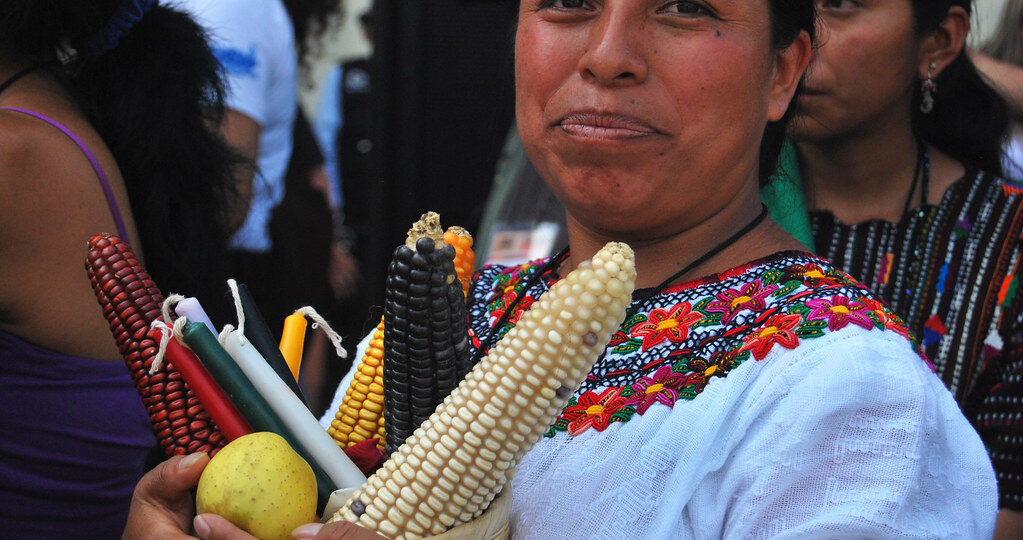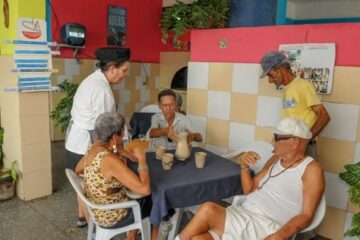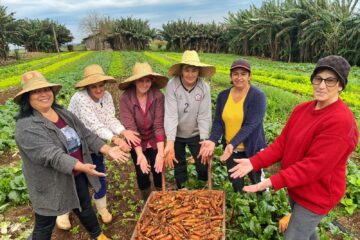We began building women’s economies because we live in an unequal world, one in which women have always contributed to life, yet we are not at its center. To confront these injustices, we have strengthened women’s various forms of rebellion within our political commitments, grounded in our own perspectives, the worldviews of our Indigenous sisters, and the long path women have walked in defense of life.
The Latin American Coordination of Rural Organizations, linked to La Vía Campesina (CLOC–LVC), has been advancing collective, political, and ideological work to position women’s human rights, echoing and contributing to life itself. This has been the political construction of our commitment to a model different from capitalism and patriarchy. We want to tell the world that there are other possibilities and other visions of life. The approach to food sovereignty has been shaped by the feelings, thoughts, and lived experiences of women. Food sovereignty represents us, includes us, and recognizes our contribution and our role as caregivers.
The care economy, feminist economy, and peasant economy cannot be separated — they form an alliance. Together, they shape the work we have been doing from the perspective of peasant and popular feminism. It is also essential that we, as women, build our identity and autonomy. This identity has been forged through the major political commitment of peasant and popular feminism, and it is important to name it explicitly. This means recognizing the role that we have played throughout history.
Speaking of care means recognizing that we have always been connected, caring for the land, the community, children, family, neighbors, and everyone around us. The big question is: when do we, as leaders, mothers, producers, caregivers of life, and so many other things in our territories, get to take care of ourselves?
Violence runs through our bodies and tears us apart, but it also brings us together to reflect and to build our national and international political agendas. Through the construction of identity, the worldview of Indigenous women, and peasant economy, we also bring forward the struggle for sexual and reproductive rights. The first territory we defend and care for is the body–territory, because it tells us when we feel well and when we cannot take another step. Listening to ourselves is key if we are to truly listen to others.
It is essential that we make decisions for ourselves, because no one — neither the state, nor the Church, nor society — can decide for our bodies. We, as women, are deeply engaged in production. We cannot build women’s economic power without recognizing that we are subjects of rights and that we are organized to create our own economic initiatives and strategies.
It is important to address the social determinants of health, because we are connected to both feeling and thinking. Well-being goes beyond prescriptions and medical appointments — it is, above all, about how we listen to ourselves and define ourselves. The political, social, cultural, and democratic spheres in which we live are part of women’s emotional stability. We have arrived at this reflection through all the work we have done in defense of the land and territory, and against the many waves of criminalization, persecution, and violence. We needed to create spaces for reflection, gathering, self-care, and healing of the soul, the heart, the mind, and the body.
When it comes to work and care, the state owes a debt to women — a debt in terms of social protection, dignifying wages, and seeking equality for women who contribute just as much as men. This is where class struggle and the sexual division of labor intersect. Women’s labor fuels capitalism and transnational corporations. Many times, women stay at home cleaning, cooking, and ironing so that men employed by companies can go to work. Taking care of children, doing housework, and working the fields is not love — it is work.
In Honduras, 58.72% of the labor involved in seed preservation, food production, care for territories, and care for families is unpaid. The government is promoting a bill for a care policy, and we have contributed to this process through our work on care and women’s economies. We also get tired, we are also present, we also contribute to our society’s economy. We are not proposing a debate about who does it better, nor a competition between men and women. Our struggle is against a predatory, capitalist, and patriarchal system that violates women’s human rights and kills us.
For La Vía Campesina, bringing the issue of care rights to the forefront also means reflecting on how to address it in the territories. We have built an important component of this work: advocacy and the ongoing construction of alliances with national and international organizations — feminist, Indigenous, peasant, and all others with which we identify. There must also be alliances with the state. It is essential that our training processes and political education schools always value women’s contributions. Our economies sustain and transform life, as we care for everyone. That is why it is vital that our minds, our hearts, and our economies achieve the autonomy we need.
Yasmín López is a peasant, Indigenous, and feminist activist. She is part of La Vía Campesina’s political committee in Honduras, an advisor to the Council for the Integral Development of Peasant Women (CODIMCA), and coordinator of the political–pedagogical commission of the School of Peasant Education Margarita Murillo (Escuela de Formación Campesina Margarita Murillo). This article is an edited transcript of her presentation during the webinar “Building Proposals for Feminist Economy and Environmental Justice,” organized by Friends of the Earth International, the World March of Women, Capire, and Real World Radio on July 15th, 2025.




